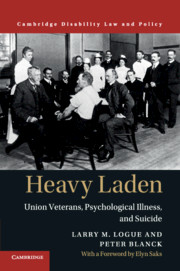Book contents
- Heavy Laden
- Cambridge Disability Law and Policy Series
- Heavy Laden
- Copyright page
- Epigraph
- Contents
- Figures
- Tables
- Foreword
- Acknowledgments
- Introduction
- 1 What Is a Union Veteran?
- 2 Changed Men
- 3 When War Came
- 4 Perilous Years
- 5 Aftershocks
- 6 Trials of Black Veterans
- 7 Heavy Laden
- Conclusion: This Freedom from Insanity
- Appendix: Sizing Up Sources
- Bibliography
- Index
Conclusion: This Freedom from Insanity
Published online by Cambridge University Press: 21 July 2018
- Heavy Laden
- Cambridge Disability Law and Policy Series
- Heavy Laden
- Copyright page
- Epigraph
- Contents
- Figures
- Tables
- Foreword
- Acknowledgments
- Introduction
- 1 What Is a Union Veteran?
- 2 Changed Men
- 3 When War Came
- 4 Perilous Years
- 5 Aftershocks
- 6 Trials of Black Veterans
- 7 Heavy Laden
- Conclusion: This Freedom from Insanity
- Appendix: Sizing Up Sources
- Bibliography
- Index
Summary
- Type
- Chapter
- Information
- Heavy LadenUnion Veterans, Psychological Illness, and Suicide, pp. 217 - 220Publisher: Cambridge University PressPrint publication year: 2018



